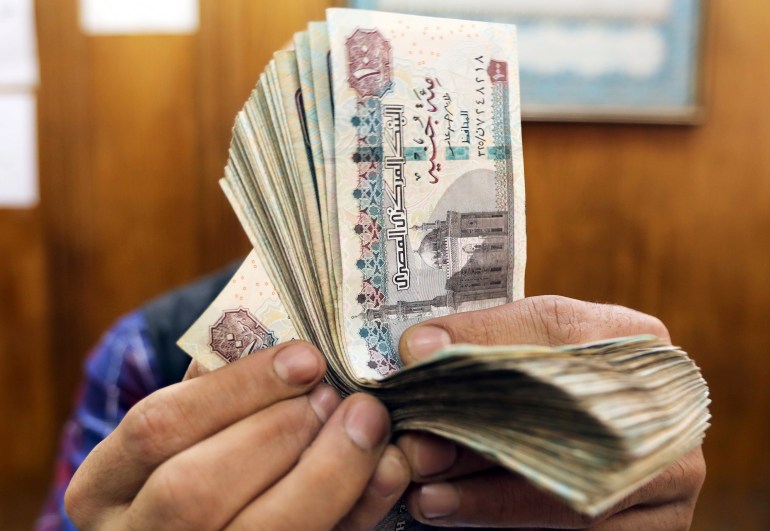Cairo – Egyptian state administrative employees are anticipating the largest wage increase of its kind, announced recently by President Abdel Fattah al-Sisi at 50%, set to take effect at the beginning of the new month. There are fears of a sharp devaluation of the local currency (the pound).
The unprecedented package aims to urgently alleviate the cost of living for citizens and contain as much as possible the repercussions of external economic crises and their internal impacts, according to a statement from the Cabinet.
Read also
- Other Aspects of Floating: Inflation Looms over Egypt’s Economy
- Egyptian Pound Rises on the Parallel Market: Will It Continue to Soar?
- Silver: Egyptians’ New Choice to Preserve Their Savings
The Deputy Minister of Finance, Ahmed El Sayed, denied rumors linking the approval of this social package to upcoming economic matters, alluding to an imminent pound devaluation in response to the International Monetary Fund’s conditions.
Largest Increase of Its Kind
This marks the second increase in less than a year, costing 180 billion pounds (5.8 billion dollars). The most recent wage increment was 500 pounds, reaching 4,000 pounds in September of last year. This is the sixth raise in five years, indicating a continuing spiral of high prices and pound devaluation.

This latest increase, the second in less than a year amounting to 180 billion pounds, saw the previous wage increase of 500 pounds (Reuters).
The incentives cover various job levels from the sixth grade up to the high and distinguished grades, benefiting 4.5 million employees at an annual cost of approximately 16.4 billion pounds.
Additionally, around 336.4 thousand employees in public economic bodies will also benefit from this increase, at an annual cost reaching approximately 1.2 billion pounds, according to the Finance Minister.
Days ago, President Sisi issued an urgent social package described by local media as the largest of its kind, set to be implemented starting next month, including:
- Increasing the minimum wage by 50% to reach 6,000 pounds monthly (around 195 dollars).
- Raising the wages of state employees and those in economic bodies by between 1,000 to 1,200 pounds monthly depending on the job grade.
- Implementing an additional incentive starting from 500 pounds for the sixth grade, increasing by 50 pounds for each grade to reach 900 pounds.
- Increasing pensions by 15% for 13 million citizens, and raising “Solidarity and Dignity” pensions by 15%.
- Additional increases for the wages of medical professionals, teachers, and faculty members.
- Raising the tax exemption threshold to 60 thousand pounds by 33% for all state employees, including those in the private sector.
Wage allocations and employee compensation in the general state budget for the fiscal year 2023/2024 are estimated at approximately 470 billion pounds or around 15.2 billion dollars (4.0% of the GDP).
Floating of the Pound and Soaring Wages
Banking and economic expert Sahar Eldamaty dismissed the idea that the decision to implement the social package is connected to an imminent pound devaluation, stating that “devaluing the pound is an economic decision aimed at reaching a balance between supply and demand. However, what is happening is that markets exploit governmental decisions to increase interest rates or raise wages to inflate prices.”
Eldamaty, in statements to Al Jazeera Net, expressed her belief that the new significant social package is not aimed at compensating for previous price hikes, especially considering an increase less than a year ago. Rather, it comes after a study of the economic developments’ impacts on prices between the two instances. Taking into account that inflation reached 40% last year, burdening vulnerable and middle-income groups, it was necessary to reconsider the social aspect so people can live and continue.
Regarding managing these allocations amidst a budget deficit, Eldamaty explained that the state has been operating under a budget deficit for decades due to rapid population growth and high support expenditures. However, she believes that the new austerity program by halting new projects and reducing imports bills will generate significant sums to support the social package.
She indicated that the imminent agreement with the International Monetary Fund includes financial allocations to provide a social safety net for the poor and vulnerable groups, and work on reducing the state budget deficit, considering that Egypt is going through an exceptional period starting from the COVID-19 crisis to the Russian-Ukrainian war and its repercussions, impacting the country’s resources.
Current Budget Deficit
- 849 billion pounds (27.5 billion dollars) cash deficit (difference between expenses and revenues).
- 1,120 billion pounds (36.3 billion dollars) value of domestic and foreign public debt interest.
- 1,316 billion pounds (42.6 billion dollars) value of owed installments from public debt.
- Thus, the public debt burdens amount to 2,436 billion pounds (around 79 billion dollars) or 114% of the total state general revenues of 2,142 billion pounds (69.3 billion dollars).
Increase Consumed by Hikes
“It can’t get better than before,” as stated by Ashraf Hosny, a member of the board of the foodstuffs department at the Cairo Chamber of Commerce, pointing out in his interview with Al Jazeera Net that “a new wage increase does not compensate for the significant price hikes. The decision aims to consider the tough economic conditions due to the devaluation of the pound and price hikes.”
However, he expects the decision to pave the way for a new pound devaluation, subsequently leading to price hikes in basic goods and services that have become costly for the state, such as fuel and water, among others.
While the decision is anticipated to positively impact state employees, Hosny believes that workers in other sectors, whose numbers are about five times that of state employees, will not benefit from it. However, it may serve as a catalyst for a new wave of wage increases that benefit everyone, ultimately reflecting on the prices of services provided to citizens.

The Egyptian public debt burden represents 114% of total revenues (Reuters).
Private sector employees number about 21 million, whereas approximately 7 million work in the informal sector.
The private sector employs 80% of the Egyptian workforce, compared to 20% working for the government, public sector, and public business sector companies.
Concerning the minimum wage in the private sector, the Finance Deputy Minister said that the National Wages Council is responsible for private sector wages to closely align with the increases in the public sector.
False Sense of Wage Increase
In contrast, economic expert Ibrahim Nawar believes that “the decision to raise the minimum wage is an attempt to rescue employees from the inflation trap and an important indicator that the state is gearing up for a pound devaluation, meaning financing for any purpose without real resources contributes to igniting inflation and increasing the state’s general budget deficit.”
In his statements to Al Jazeera Net, he explained that given the increasing state budget deficit since the last fiscal year till now, this increase has an inflating nature, with a possibility of increasing pensions for all employees, including ministers and former ambassadors.
All fixed-income earners face a real dilemma, according to Nawar, including beneficiaries of social security payments like the solidarity programs. These increases have a negative impact on the economy, creating a false sense for beneficiaries that their income has increased. Thus, he expects the inflation rate to rise again after showing a downward trend in the last two months.


